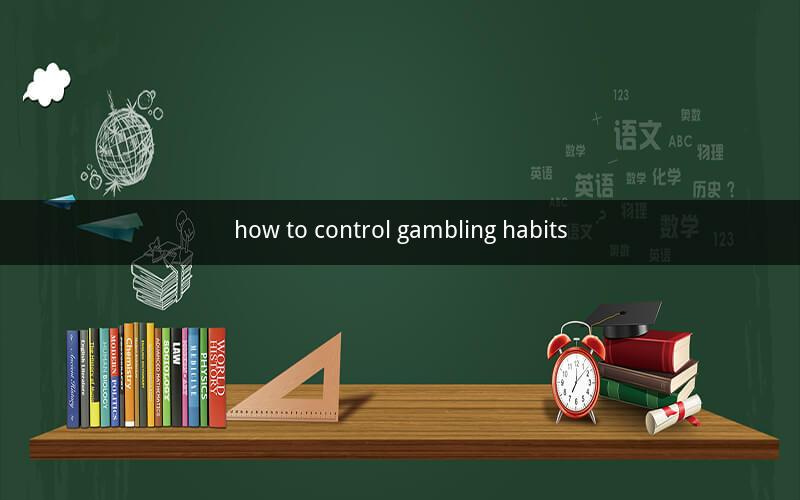
Table of Contents
1. Understanding Gambling Addiction
2. Identifying Problematic Gambling Habits
3. The Psychological and Social Impacts of Gambling
4. Strategies for Controlling Gambling Habits
- Setting Clear Limits
- Seeking Professional Help
- Building a Support System
- Developing Coping Mechanisms
- Avoiding Triggers
- Learning Financial Management Skills
5. Technology and Online Tools for Gamblers
6. The Role of Education in Preventing Gambling Addiction
7. Case Studies: Success Stories
8. Conclusion
1. Understanding Gambling Addiction
Gambling addiction, also known as problem gambling, is a condition characterized by an uncontrollable urge to gamble despite negative consequences. It is a complex disorder that affects individuals of all ages, backgrounds, and socioeconomic statuses. Understanding the nature of gambling addiction is the first step in controlling these habits.
2. Identifying Problematic Gambling Habits
Recognizing the signs of problematic gambling habits is crucial. These may include hiding gambling activities, borrowing money to fund gambling, feeling restless or irritable when not gambling, and prioritizing gambling over other responsibilities. Identifying these signs helps in taking the necessary steps to control gambling habits.
3. The Psychological and Social Impacts of Gambling
Gambling addiction can have severe psychological and social consequences. It can lead to financial ruin, strained relationships, and even mental health issues such as depression and anxiety. Understanding these impacts can motivate individuals to seek help and control their gambling habits.
4. Strategies for Controlling Gambling Habits
Controlling gambling habits requires a multifaceted approach. Here are some effective strategies:
4.1 Setting Clear Limits
Establishing strict limits on the amount of money and time spent gambling can significantly reduce the risk of addiction. Setting a budget and sticking to it is essential.
4.2 Seeking Professional Help
Therapy, counseling, and support groups can provide individuals with the tools and support needed to overcome gambling addiction. Professional help can address the underlying psychological issues that contribute to gambling habits.
4.3 Building a Support System
Surrounding oneself with supportive friends and family can provide a strong foundation for recovery. Sharing experiences and receiving encouragement from others who have faced similar challenges can be incredibly beneficial.
4.4 Developing Coping Mechanisms
Finding healthy ways to cope with stress, anxiety, and boredom can reduce the urge to gamble. Activities such as exercise, meditation, and hobbies can serve as effective coping mechanisms.
4.5 Avoiding Triggers
Identifying and avoiding triggers that lead to gambling can help prevent relapse. Triggers may include certain locations, social situations, or even specific thoughts or emotions.
4.6 Learning Financial Management Skills
Improving financial literacy and managing money effectively can help prevent gambling-related financial problems. Budgeting, saving, and investing are essential skills for maintaining financial stability.
5. Technology and Online Tools for Gamblers
Technology can be both a friend and a foe in the battle against gambling addiction. Online tools and apps can help individuals track their gambling habits, set limits, and find support. However, it is crucial to be cautious of online gambling platforms that may exacerbate addiction.
6. The Role of Education in Preventing Gambling Addiction
Education plays a vital role in preventing gambling addiction. By understanding the risks and consequences of gambling, individuals can make informed decisions and avoid falling into the trap of addiction.
7. Case Studies: Success Stories
Many individuals have successfully overcome gambling addiction. These success stories serve as inspiration and proof that recovery is possible. They highlight the importance of seeking help, building a support system, and adopting effective coping strategies.
8. Conclusion
Controlling gambling habits is a challenging but achievable goal. By understanding the nature of gambling addiction, identifying problematic habits, and implementing effective strategies, individuals can take control of their lives and overcome addiction. With the right support and determination, recovery is within reach.
---
Questions and Answers
1. Q: What are the signs of a gambling addiction?
A: Signs include hiding gambling activities, borrowing money, feeling restless when not gambling, and prioritizing gambling over responsibilities.
2. Q: How can setting clear limits help control gambling habits?
A: Setting limits helps by providing a financial and time boundary that can prevent excessive gambling.
3. Q: What is the role of therapy in treating gambling addiction?
A: Therapy helps individuals address underlying psychological issues, develop coping mechanisms, and provide a supportive environment for recovery.
4. Q: Can technology be used to help control gambling habits?
A: Yes, technology can be used through apps and tools to track habits, set limits, and find support.
5. Q: How can building a support system aid in overcoming gambling addiction?
A: A support system provides encouragement, accountability, and a sense of community, which can be crucial for recovery.
6. Q: What are some healthy coping mechanisms for dealing with stress and boredom?
A: Healthy coping mechanisms include exercise, meditation, hobbies, and engaging in activities that promote well-being.
7. Q: How can financial management skills help prevent gambling-related financial problems?
A: Financial management skills such as budgeting, saving, and investing can help maintain financial stability and reduce the temptation to gamble.
8. Q: Why is education important in preventing gambling addiction?
A: Education helps individuals understand the risks and consequences of gambling, enabling them to make informed decisions.
9. Q: What can be done to avoid triggers that lead to gambling?
A: Identifying triggers and avoiding situations or places that may prompt gambling can help prevent relapse.
10. Q: How can success stories inspire individuals to overcome gambling addiction?
A: Success stories serve as evidence that recovery is possible, providing motivation and hope for those struggling with addiction.